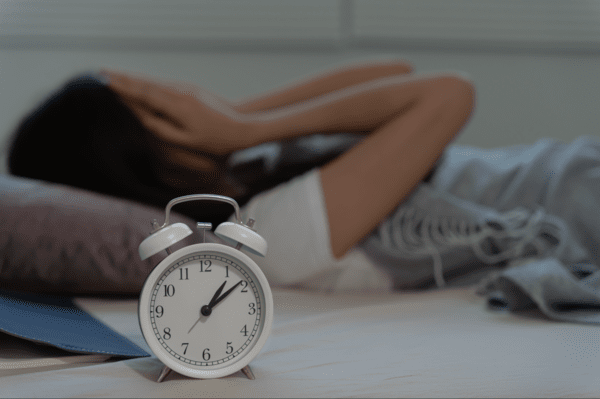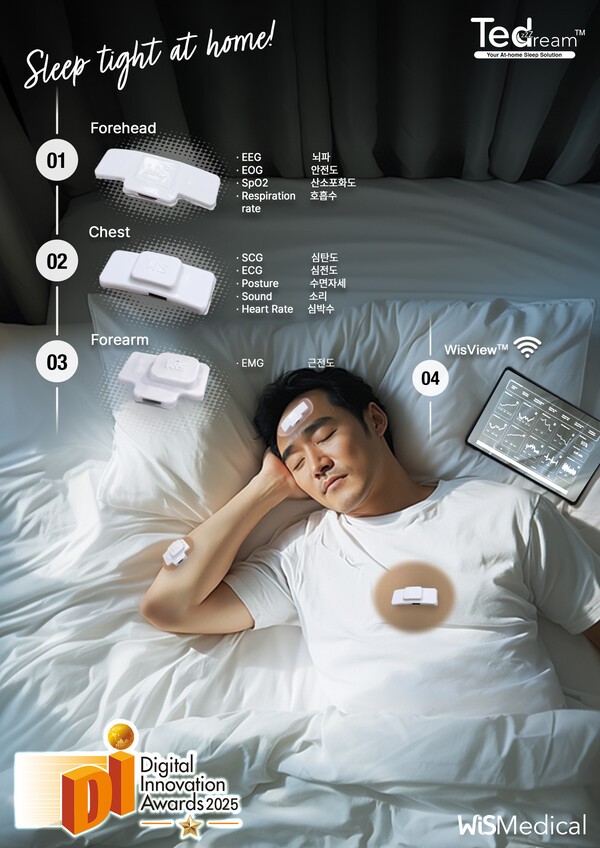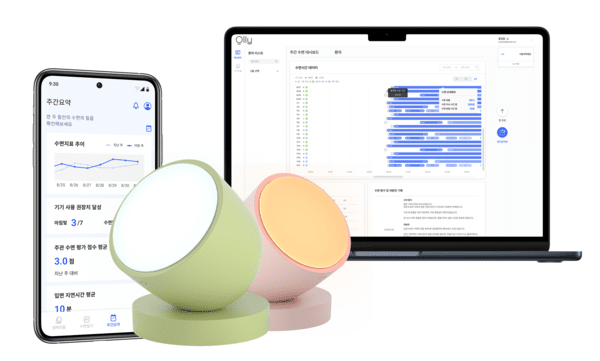
Resource
News
If you leave a question, we will respond quickly and kindly.
| K-Sleep Tech Technology from Companies at Seoul Bio Hub

Sleep tech startups are coming up with new solutions to address a variety of issues, including insomnia, sleep apnea, shift work fatigue, and jet lag.
With the late-summer heatwave and tropical nights, many people are losing sleep. At night, body temperature needs to drop for the brain to recognize that it is “time to sleep.” However, during tropical nights, the body does not cool down sufficiently. This makes it hard to fall into deep sleep, and the number of times one wakes up increases.
Even when it feels like one has slept enough, fatigue remains, and even lying down for a long time does not easily lead to sleep. At the root of this phenomenon lies a disturbance in the circadian rhythm. The circadian rhythm is the body’s 24-hour cycle. The suprachiasmatic nucleus (SCN) of the brain’s hypothalamus senses light, darkness, and mealtimes to regulate body temperature and hormones. When it gets dark, melatonin secretion increases to induce sleep, and in the morning, cortisol secretion rises to help arousal. However, night shifts, jet lag, late-night meals, and smartphone use disrupt the body’s clock.
When one experiences “social jet lag”—a mismatch between biological rhythms and actual sleep/wake times—the result is not just fatigue. It leads to sleep deprivation, which reduces immunity and becomes a catalyst for serious illnesses such as cancer and cardiovascular disease. For example, at least six hours of sufficient sleep are needed for immune cells (T-cells, NK cells) to recover and regulate their activity. Without enough sleep, the activity of immune cells decreases, weakening the ability to eliminate cancer cells or virus-infected cells. For this reason, conditions that disrupt sleep-wake rhythms, such as shift work, are considered possible carcinogenic factors. Chronic sleep deprivation increases insulin resistance, raising the risk of diabetes and making weight control more difficult. It also heightens the risks of high blood pressure, myocardial infarction, and stroke.
Improving sleep starts with basic habits: maintaining regular sleep and wake times, exposure to morning light, and consistent eating and exercise routines. When technologies such as artificial intelligence (AI) analysis and digital biomarkers are added, a new era of personalized sleep opens. Sleep solutions are shifting toward diagnosing and correcting individual biological rhythms.
To address diverse issues such as insomnia, sleep apnea, shift-work fatigue, and jet lag, sleep-tech startups are presenting new solutions. With recent awards at the Consumer Electronics Show (CES) and global expansion, K-sleep tech is gaining greater recognition. Here are the K-sleep tech technologies and services introduced by companies based in Seoul Bio Hub, a cradle for bio startup growth.
“Hospital-Level Sleep Tests, Now at Home”
WisMedical
Precision polysomnography, once available only in hospitals, is now possible at home. WisMedical enables patients to easily measure brainwaves, breathing, and heartbeats at home using the wearable device Tedream. Three wireless sensors attached to the forehead, chest, and arm capture key biological signals. Its distinctive feature is minimizing discomfort in wearing the device while maintaining hospital-level accuracy.
The core technology was developed by researchers at the Georgia Institute of Technology in the U.S. It is currently being used for research in hospitals and laboratories both domestically and internationally. WisMedical plans to obtain medical device approval from the Korean Ministry of Food and Drug Safety within the year, bring the device into actual medical practice, and enter overseas markets.
Polysomnography is the standard test for diagnosing sleep disorders. By measuring brainwaves, breathing, oxygen saturation, heart rate, and electromyography simultaneously, it identifies problems such as insomnia, snoring, and sleep apnea. Normally, it is conducted overnight in a hospital sleep clinic. It is used for accurate diagnosis and personalized treatment planning.

Tedream captures key biological signals with wireless sensors attached to the forehead, chest, and arm.
“AI and Light to Restore Broken Rhythms”
LUPLE
LUPLE provides solutions that enhance sleep quality using “light,” the key factor that drives biological clocks. Its flagship Olly series applies to insomnia, shift-work fatigue, jet lag, and more. It combines AI-based lifestyle pattern analysis with customized light therapy. Its clinical trials have proven effectiveness, earning two CES Innovation Awards and global recognition for competitiveness.
LUPLE’s principle is phototherapy. By using light of specific wavelengths and intensities, it synchronizes the body’s 24-hour biological rhythm. In the morning, it enhances alertness and concentration, while in the evening, it promotes melatonin secretion to support deep sleep. It can also be used for jet lag adaptation during business trips or for night shifts.
Recently, LUPLE has been expanding into markets including educational institutions, large corporations, hospitals, and construction companies. It is evolving into an intelligent healthcare hub that automatically creates optimal light environments in homes, workplaces, and public facilities.

The ‘Olly’ series is applied to problems such as insomnia, shift-work fatigue, and jet lag adaptation.
“A Sleep Coaching App that Changes Habits Instead of Using Medication”
Sleepforest
Sleepforest is developing an intelligent app that helps users restore their daily rhythms on their own. The app analyzes users’ sleep patterns and pre-sleep behaviors to propose personalized routines. It also provides non-drug solutions based on cognitive behavioral therapy for insomnia (CBT-I), including breathing training, healing sounds, and environment control guidance.
CBT-I corrects anxious thoughts such as “It’s a disaster if I can’t sleep” and helps establish regular sleep and wake habits. It reduces dependence on medication and supports natural recovery. Sleepforest is collaborating with hospitals and research institutes to refine tailored programs for insomnia patients and shift workers. It plans to expand toward the level of digital therapeutics in the future.
“Wearables + AI to Even Predict Risks of Depression and Dementia”
Hucircadian
Hucircadian is introducing a circadian rhythm healthcare platform based on wearable devices and AI. The platform collects users’ biological signal data, which AI analyzes to predict risks of conditions such as depression, insomnia, and dementia at an early stage. At the same time, it proposes personalized intervention therapies suited to individual lifestyle patterns. “Intervention” refers to measures that alter lifestyle, behavior, or environment to reduce disease risk or slow progression.
Hucircadian is pursuing two business models simultaneously: one as a digital therapeutic prescribed by medical professionals, and another as a subscription-based wellness service for general consumers.
Reporter Minyoung Lee (lee.minyoung@joongang.co.kr)
Posted 2025.08.21 07:30 Edited 2025.08.21 07:56
https://jhealthmedia.joins.com/news/articleView.html?idxno=30850


